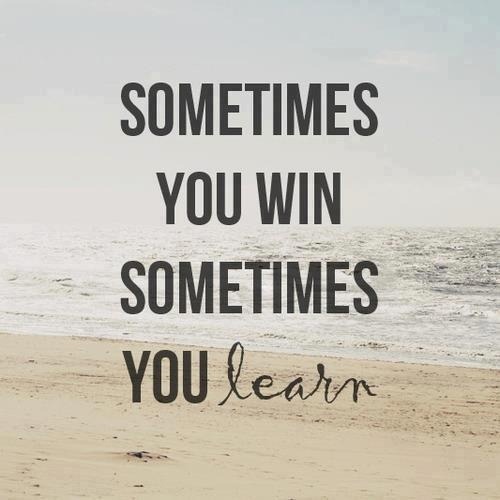Hello there everyone! I am sorry for missing Friday contrary to my original plans. There were some personal things I had to deal with and I was quite busy working too! But here we are on a lovely Saturday night to discuss this week's reading: Chapters 1 and 2 from Maxwell's
Sometimes You Win Sometimes You Learn.
Quote of the week: "Humility does not mean you think less of yourself. It means you think of yourself less" (Ken Blanchard).
Dealing with loss and failure are really our only opportunities to develop character--to foster greatness. It is difficult to appreciate what you have in life if you've never had anything taken away from you before, and Maxwell also makes an excellent point that winning is an easy cycle: you set your goal, you work hard, you achieve your goal, repeat. This cycle is a great one to be caught up in if you're in it, but it's predictable. Losing, on the other hand, is unpredictable, is often unwarranted, and it comes in many different forms that must be dealt in a various amount of different ways. Our most powerful and important lessons from life are learned from our own suffering.
Actually, Friedrich Nietzsche said, "
To live is to suffer, to survive is to find some meaning in the suffering." Nietzsche is a fascinating philosopher with many radical beliefs, but one of his major points is that greatness is achieved through suffering. Characters like Abraham Lincoln, Ludwig van Beethoven, Vincent van Gogh, and many more arrived to their places as historical and artistic heroes primarily because they suffered and bore mountains of pain and agony. So, Nietzsche argues that in order to become the "
uberman," one must seek to find strife.
Maxwell, however, emphasizes not the quantity of our pain or losses, but the quality in which we deal with them.
This week, we focus on humility, the spirit of learning.
He outlines four reasons concerning why humility fosters the right attitude for learning from our losses in pages 25-33:
- Humility allows us to possess a true perspective of ourselves and life.
- Humility enables us to learn and grow in the face of losses.
- Humility allows us to let go of perfection and keep trying.
- Humility allows us to make the most of our mistakes.
I think that the other fellow Type-A personalities out there will wrestle with some of these ideas just as I did while reflecting on the chapter. Type-A people tend to be high-achievers, and high-achievers tend to take pride in all they've accomplished. However, pride can be damaging because it often blinds us to our own flaws--which you can see problem considering that our flaws are often the cause of the mistakes we make in life.
Humility keeps a person calm in the face of a setback, and also in the face of victory as well. See, humility is so important because it keeps in mind that we are not perfect. Imperfection must be accepted as a part of us all, and there is always room for some sort of improvement.
Maxwell uses the case study of Samuel F. B. Morse to draw an example of where humility in the face of loss led to learning, and thus achievement.
This was a young man who attended Yale University and excelled in a variety of challenging classes. His dream was to be an artist, and when his parents allowed him to go pursue painting, and he traveled all over the place when people commissioned him to paint portraits. He was in Concord when he fell in love. He wrote to his parents:
"
She is very beautiful, and yet no coquetry, she is modest quite to diffidence and yet frank and open hearted...Suffice it to say we are engaged...never was a human being so blest as I am, and yet what an ungrateful wretch have I been; pray for me that I may have a grateful heart for I deserve nothing but adversity, and yet have the most unbounded prosperity."
They were married, and Morse found great success in his painting career. He also used some of his knowledge to help develop a water pump for fire engines and a marble-cutting machine to carve sculptures.
Morse was in New York working on a painting in 1825 when he received word that his wife was ill. Although he immediately rushed home, by the time he had arrived, she had already died and he discovered that he had also missed her funeral. Can you imagine the distress and grief he must have suffered?
His loss led him to search for ways to improve the painstakingly slow communication that existed during that time. Seven years later, he developed Morse Code, which revolutionized communication.
Nonetheless, he still maintained the spirit of humility, and he said, "I have made a valuable application of electricity not because I was superior to other men but solely because God, who meant it for mankind, must reveal it to someone and he was pleased to reveal it to me."
Maxwell comments, "With that attitude, no wonder he was able to bounce back from his losses, learn, and grow. He possessed the spirit of learning. And we would do well to obtain it too" (35).
So you can see, humility in the face of adversary can lead to great achievement!
However, I wanted to mention that there is a fine line between self-confidence and arrogance. Maxwell touches on the difference in the second chapter, but I wanted to explore a bit more on my own how we can obtain a spirit in which humility and self-confidence can coexist in harmony.
How do we foster a humble soul?
Well, I approach this question in the same way that I would approach many other "How..." and "Why..." questions: through prayer and meditation.
Let's start to develop some humility and still maintain a sense of self-confidence today by just taking 5-10 minutes answering these questions every day this next week:
- In general, how was my day today (or yesterday)?
- What am I grateful for?
- What have I done wrong? How could I have done better?
- What am I going to do tomorrow (or today) to help right a wrong, or to make something better?
After answering these questions, let's ask God to help in finding the strength to act better in the future.
There's no quickfire way to develop humility, but let's make it a goal this next week to follow this meditation and see if we notice any changes in our hearts and attitudes.
(Note: These questions are taken from a variation of the
Jesuit Examen, which is a guide for prayer/meditation that has several variations. Please see
this post to read my response to practicing the Examen for a week. For other variations of the Examen and to learn more, click
here.)
So this concludes all I have to say about Maxwell's first and second chapters. What did you think? Let me know in the comments below! Also, please subscribe to Smiles No Matter for future updates. Next week, we'll be studying the third and fourth chapters on Friday. Hope to see you then!
Smile on,
-Riley XO












